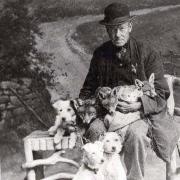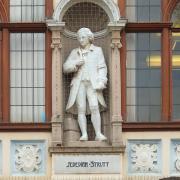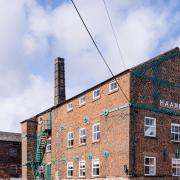Derbyshire Life meets the second politician to be elected to the prestigious policing post and discovers his passion for delivering justice for all

There may have been only 1,613 votes separating Hardyal Dhindsa from his nearest political rival in the race to be Police and Crime Commissioner in last year’s election, but the winning politician believes his victory gives him a clear mandate to make Derbyshire one of the safest places to live and work in the country.
As the county’s second Police and Crime Commissioner, Hardyal has also secured his name in the political history books – because in victory he became the first black and minority ethnic person in the country to win a police and crime commissioner contest since the political office was established by the previous coalition Government in 2011.
‘My election to the post of Police and Crime Commissioner is the pinnacle of a life in public service. It was an exciting and hard fought election and I was delighted with the result,’ proclaims Hardyal as he welcomes me to his modest and functional office, which is located in Ripley on the same site as the Derbyshire Police headquarters.
In taking office, Hardyal is required, by law, to hold Mick Creedon, the Chief Constable of Derbyshire Police, to account for the performance of the Force. Even though there have not been any dramatic rises in crime in the county over the past few years the Force still deals with 53,000 offences per year. Hardyal has overall responsibility for allocating the Force’s budget, which this year sits at £162.8 million. Another crucial element of his role involves setting the council tax precept for policing, which residents across the county pay.

In addition he is responsible, through the Chief Constable, for the overall welfare of almost 2,000 serving police officers, hundreds of volunteer special police officers, dozens of police community support officers and almost 1,500 police support staff throughout the county.
With over 30 years’ experience of working in the criminal justice system, combined with his election to a series of senior political roles in local government, Hardyal is well-placed to manage the demands of his office. He has built an enviable reputation as an effective operator, with a willingness to take a realistic and pragmatic approach to problems. He is a politician who is determined to find solutions to challenges and is eager to think outside traditional strategic policing boundaries, especially when it comes to creating unique and forward-thinking partnerships with other agencies.
In typically reflective style he appears to take nothing for granted and he is determined to make the most of his four-year term of office – and this may be one of the main reasons why in his acceptance speech at Derby Arena on 6th May 2016, he wanted to stress that he wishes to be ‘a commissioner for the whole of Derbyshire: urban, suburban and rural.’
‘I have been elected for four years and I know this time will pass quickly. I am passionate about this county and its residents. I want to improve the quality of life in our communities by tackling the issues that really matter to them,’ he says.

Hardyal, 58, is no stranger to the Office of Police and Crime Commissioner, having served as a deputy to the county’s first post-holder, Alan Charles. ‘I was fortunate to work as Alan’s Deputy Commissioner for a little over three years and I am able to use the experience I gained to help shape my thinking and my plans for the coming years,’ he explains.
Despite having served as deputy commissioner, Hardyal was aware that his pathway to secure the nomination as the Labour candidate for commissioner was not guaranteed. The process was never going to be a coronation and he had to endure a rigorous selection process before he was put on the ballot as the Labour contender for the role.
‘My road to securing the nomination was interesting but based on the solid foundation I had built as deputy, I was fortunate to have a track record to speak from. This record combined with my life experiences, stretching back to childhood, and throughout my work and political life, led to my selection as the Labour candidate,’ he says proudly. ‘Victory at the polls in May was, in many ways, the conclusion of a life in the world of criminal justice and I am determined to serve the people who placed their faith in me.’
Hardyal’s journey to the highest criminal justice political office in the county began when he arrived in Derbyshire at the age of nine, having travelled to England from the Punjab, north India, in 1967.

‘My father was one of the first Indian pioneers to come to England to build a better life for his family,’ he recalls. ‘Dad embraced quickly his new life in Derby, becoming a much-respected councillor; spending much of his time helping disadvantaged people, assisting them in whatever way he could, including helping them to read and write – something he did for free and with great compassion. This made him very popular.’
These early years gave him some powerful life experiences that had a major impact on Hardyal’s future. ‘I am very proud that my father was the first black and minority ethnic councillor in Derbyshire – and he was also the first Indian-born mayor in the East Midlands.’
One of Hardyal’s most formative memories involved a visit to a local factory with his father. ‘I will never forget the day my father took me to a factory in the heart of Derby. We toured the workplace together and then at the end of the visit he told me I had two choices in life – I could work in a place like this or I could study hard and get a profession. With some speed I picked the second option and embraced education,’ he grins.
This thirst for educational improvement and advancement was inevitably to take Hardyal away from the county where he grew up. He became the first person in his family to go to university when he left home to study psychology at University College of North Wales, in Bangor.
‘What an amazing time that was!’ recalls Hardyal. ‘For two years I lived on Anglesey – a landscape very similar to the Peak District. I remember one day waking up in the morning to find my way to university blocked with snow; and we had to dig our way out which was great fun. I was always interested in psychology and the way people behave and I remember doing a project on how learning disability can impact on people entering the criminal justice system.’
After his studies he moved to Bromsgrove in the West Midlands to start work as an assistant psychologist in the National Health Service. During this time his father encouraged him to come back to Derby to help out with local election campaigns and these frequent visits were to prove a very strong pull for Hardyal to return home.
In 1981, this desire to move back to his childhood county was to come to fruition. He applied for a job as an assistant warden at an approved probation hostel in Bass Street. ‘I got the job and moved back to the city. My job in the hostel involved supervising the activities of about 17 men each night. On weekends I worked on my own – which was challenging but very rewarding,’ he says. ‘This required a lot of compassion as well as an ability to make sure everyone followed the rules. It was pleasing to help people with basic life skills, such as cooking and money management, so that once released into the community these people could become more independent.’
Hardyal’s compassion for helping offenders was noted by the management of the Probation Service and he was invited to apply to study to become a probation officer. He spent the next year qualifying as a social worker at the London School of Economics. ‘This was an interesting time in my life – I had only just got married and within one year we had our first child and I started work as a probation officer in Tower Hamlets, London.’
After three years he returned to Derbyshire because of family reasons to take up a role as a probation officer in Derby. ‘I transferred back to Derbyshire and joined a programme team delivering courses for offenders convicted of domestic violence,’ he says. ‘Soon after I applied for promotion and moved to Nottinghamshire Probation as a probation manager looking after the Mansfield and Ashfield areas.’ He was to spend the next 22 years of his life in Nottinghamshire rising to senior management roles – ultimately as an assistant director with responsibility for overseeing a £22 million budget and 500 personnel.
Hardyal believes strongly that while offenders must be held to account for their crimes they also need rehabilitation to prevent reoffending – with the aim of them integrating back into their communities and neighbourhoods.
Towards the end of his probation career he spent two years on secondment as deputy director at the pioneering Nottingham Crime and Drugs Partnership, working to combat the negative social and criminal impact of drugs and alcohol misuse. ‘We prioritised community safety and aimed to tackle crime through multi-agency approaches that addressed not only enforcement but prevention as well,’ Hardyal remembers.
Throughout his career in the criminal justice system Hardyal managed to juggle successfully his other lifelong passion – his commitment and service to the Labour Party. ‘All those years helping Dad in his many elections was a natural breeding ground for my interest in helping people and securing a fairer, more equal society, based on socially just values,’ he explains. ‘I was first elected in 1993 to Derbyshire County Council and apart from a short period between 2002 and 2004 – when the public asked me to take a compulsory sabbatical – I have served either as a city or county politician.’
During this time Hardyal held a number of senior roles in local government including Executive Cabinet Member roles in Education, and in Adult and Social Care, Leisure and Culture, and Environment and Public Protection. He also represented Derby City Council for over 10 years on the former Derbyshire Police Authority and was the lead non-executive member that implemented the findings and recommendations of the Stephen Lawrence Inquiry.
In 2012 he was appointed to the role as deputy commissioner and took the lead for the Alcohol Summit, Volunteer Programme, Mental Health Summit, and equality and diversity within the Office of the Police and Crime Commissioner. He also represented the Commissioner on the Contact Management Improvement Board.
Hardyal is quick to point out that when he started his new role he took responsibility of a Force in a strong position. In a recent assessment of Derbyshire Constabulary, Zoe Billingham, Her Majesty’s Inspector of Constabulary, judged the Force to be ‘good’, stating: ‘I am pleased with the performance of Derbyshire Constabulary in keeping people safe and reducing crime.’
Hardyal explains: ‘The Force has responded to the significant financial pressure all of us have faced. We will continue with our robust and credible plans to secure its future. There is, however, no room for complacency and I will continue to challenge the Chief Constable to meet those challenges we will face in the future head on. There will be difficult decisions that need to be taken and the way in which Derbyshire is policed will change, but my challenge will always be to be there for the Chief Constable and to ensure those changes are necessary to continue keeping people safe and reducing crime.’
During the election campaign in May, Hardyal made a number of pledges to deliver in office. Many of these priorities were close to his heart and some are a continuation of his work during his time as deputy commissioner. ‘I am determined to assist those with mental health issues, including those with learning difficulties, who come into contact with the criminal justice system,’ he says. ‘Whether as a victim or an offender it is important that they get the right support, from the right agencies at the right time.’
Hardyal estimates that almost 60 per cent of the people arrested have some form of mental health issues. ‘I will continue to work with partners to ensure those with mental health issues who come into contact with the system are supported – and I will continue to chair our partner working in the development of the Mental Health Crisis Care Concordat,’ he explains. ‘This involves joint partnership working between 15 separate agencies.’
He is also determined to develop strategies to reduce the impact of drugs and alcohol throughout the county. ‘I will continue to work with all partners, licensing authorities and stakeholders to create long-lasting solutions to reduce anti-social behaviour,’ he says.
One of his most eye-catching initiatives that he wishes to implement over the next four years is a plan to visit all of the 383 towns and villages in Derbyshire in order to reach out to the county’s varied geographical communities. ‘My schedule has been designed to help me understand what local people want to make them feel safer and how we can do things differently to improve their experience of policing.’ The Commissioner’s progress on his tour can be found on Twitter via: #D383.
Hardyal, a grandfather, says he only needs about five hours of sleep each night, and is clearly committed to making the most of his four years of office. When he manages to take a break from his work he loves to follow Derby County Football Club and is a season ticket holder. ‘I also love to walk in the Peak District and spend time on the Tissington Trail and I enjoy exploring Cromford, Matlock and visiting the historic town of Chesterfield.’
He has three grown-up sons but interestingly none of them have yet to express a desire to follow him into a political role. ‘It perhaps isn’t for them!’ he says with a big smile.
For information about the Office of the Police and Crime Commissioner call 0300 122 6000.or visit www.derbyshire-pcc.gov.uk



























